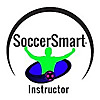
Coach DiBernardo – Developing The Soccer Brain
663 FOLLOWERS
Coach DiBernardo is a leader in cognitive soccer theory and constraint based training methods, his work revolves around increasing the soccer IQ and skill levels in players. Coach DiBernardo's methods have been viewed by hundreds of thousands of coaches from around the world.
Coach DiBernardo – Developing The Soccer Brain
3w ago
By Marcus DiBernardo
Methodology
Connecting academic theory to practice session design may sound weird, unfamiliar, and strange to most coaches. Traditional coaching education often teaches rigid practice sessions, timed to the second, pre-determined coaching points, hammering out of sub-principles, and even sub-sub principles, as the coach takes on the role of Jesus in a sweat suit, imparting knowledge from the top down (all-knowing coach gives wisdom to the players). In this digital information age, it is simple to watch a training session from the internet and replicate it with your team, b ..read more
Coach DiBernardo – Developing The Soccer Brain
1M ago
First, I am supportive of education and becoming a better coach. The USSF instructors I have had so far are all nice guys with the best of intentions. That’s the good news.
The bad news…it’s going to take a while. Let me start out with my own story. I received my USSF D license in the 1990’s at Hall High School in CT. That was back in the day when USSF gave a paper certificate for passing, and entered your name in the state USSF database. After earning my D license I took some time off, before deciding to take my next license. It turns out that I could not find the paper certificate, so I call ..read more
Coach DiBernardo – Developing The Soccer Brain
1M ago
I always get to the point, expressing my unbiased views on accepted mainstream coaching education perspectives. Today I will quickly address the holy grail of coaching education called the “Questioning Method”. Let’s start at the foundation, words have severe limitations in their ability to communicate impactful information in order to drive behavior, organization, and decision-making. Ask a bunch of 8 years old’s what do you do when your team wins the ball? They all yell – “spread-out”, but they don’t do it, and they have no idea how to do it. Questioning means absolutely nothing ..read more
Coach DiBernardo – Developing The Soccer Brain
4M ago
Becoming skillful is not about muscle memory using block practices or isolated rote methods. Performing a skill that was learned in non-representative game environments is something anyone can do, the real question is can that skill be transferred to the real game effectively? Performing a skill with muscle memory outside of the game context can be called a “dumb” skill. Dumb skills require no adaption of intentions or technique, there is no real information surrounding the application of the skill itself. Examples of dumb skills outside of soccer could be clicking a computer mouse or punching ..read more
Coach DiBernardo – Developing The Soccer Brain
5M ago
When I hear a coach say that he or she developed all these top players, I say stop stroking your ego. You probably helped guide players by creating really good game-representative environments, but you can’t take credit for developing them like your Jesus with a whistle. The fact is that top players have thousands upon thousands of hours of street soccer, cage soccer, beach soccer, futsal, and even technical training by themselves in their own unique environment. Last spring I helped send an 18-year-old player to a team in the English Championship (they took him to pre-season with the full pro ..read more
Coach DiBernardo – Developing The Soccer Brain
7M ago
Connecting Academic Theory to Training Session Design
I wanted to begin the conversation about coaching and player development at the very foundation, and for me, this starts with connecting of academic theory to practice session design. There are two main academic theories that are used to explain skill acquisition and decision-making, they are the ecological dynamics theory and the cognitive processing theory. I subscribe to the ecological dynamics model because it can be quantified mathematically, and it makes more logical sense to me, especially in a sporting context. My entire soccer meth ..read more
Coach DiBernardo – Developing The Soccer Brain
7M ago
This short video shows a game-representative practice session in small spaces that connects academic theory to practice session design ..read more
Coach DiBernardo – Developing The Soccer Brain
9M ago
Differential Learning Another part of my methodology is called “Differential Learning”. Differential learning is about de-stabilizing the existing movement solution by adding additional components that create a de-stabilizing effect. This type of training does not always need to be highly game representative but I always favor more representative. The individual must self-organize their movements through the destabilizing process, pushing them to find solutions outside of their normal movement patterns. The main objective of DL is to allow an athlete to gain information about the soluti ..read more
Coach DiBernardo – Developing The Soccer Brain
1y ago
Below is a slide show that introduces the concept of connecting academic theory to practice session design and principles of play. Ecological Dynamics is the academic theory that I use as the foundation of my methodology ..read more
Coach DiBernardo – Developing The Soccer Brain
1y ago
Below is an introduction to my latest work called “Constrained”. If you are a coach looking to be challenged and pushed, then this book is for you.
Connecting Academic Theory to Training Session Design
I wanted to begin the conversation about coaching and player development at the very foundation, and for me this starts with connecting of academic theory to practice session design. There are two main academic theories that are used to explain skill acquisition and decision-making, they are the ecological dynamics theory and the cognitive processing theory. I subscribe to the ecological dynamic ..read more